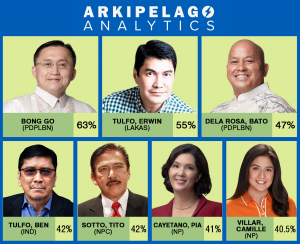MANILA — The Pamilyang Magsasaka Party-list officially filed its certificate of candidacy (COC) for the 2025 national elections, with a commitment to restore the original intent of the party-list system—giving genuine representation to marginalized sectors—and address the widespread exclusion of family farmers from government support.
All of the Pamilyang Magsasaka Party-list’s ten nominees are smallholder family farmers with four women, two youths, one fisher, and a representative from a Bicol indigenous group. These leaders have been deeply involved in their communities’ struggles for agrarian reform, rural development, and environmental sustainability, making them ideally positioned to represent the sector in Congress.
“Our leaders are not just advocates but real farmers who understand the plight of smallholder farmers across the country,” said Randy Cirio, number one nominee of Pamilyang Magsasaka Party-list. His organization, Banasi Farmers Association, is a recipient of the government’s Comprehensive Agrarian Reform Program (CARP). He was among the youngest participants in the 2008 444-km march of Banasi Farmers to Manila to claim their land under CARP. The Supreme Court eventually ruled to give123 hectares in favor of the Banasi Farmers Association members. “We firmly believe that our organic leaders have the capacity to effectively represent our sector in Congress because they have lived through and fought for the issues we aim to address.”
Addressing farmer exclusion
Pamilyang Magsasaka aims to highlight the exclusion faced by millions of family farmers in the Philippines. Of the country’s 10 million family farmers, eight million are effectively excluded from government programs and resources due to their non-membership in organizations. Even among the two million members of cooperatives and associations, 99 percent lack paid staff and do not provide meaningful services, leaving two million farmers suffering from hunger, with four million living below the poverty line.
Reclaiming the party-list system
The Pamilyang Magsasaka Party-list is committed to reclaiming the partylist system’s Constitutional aim of providing marginalized sectors with genuine representation, a system that money politics and political dynasties have bastardized. The party-list system, originally intended for sectors such as farmers, fishers, and indigenous peoples, has been co-opted by the powerful, leaving the marginalized even more vulnerable.
Key Endorsements and Legal Support
Pamilyang Magsasaka is backed by Pambansang Kilusan ng mga Samahang Magsasaka (PAKISAMA), a 38-year-old national confederation of family farmers’ organizations known for its leadership in agrarian and fisher reform and organic agriculture advocacies. The Party also benefits from the pro-bono legal services of Atty. Emil Marañon III and his team at Trujillo Ansaldo Marañon Law Offices.
Pamily Magsasaka Partylist’s Legislative Agenda
If elected, Pamilyang Magsasaka Partylist plans to champion policies that directly benefit smallholder family farmers, including:
- Agrarian Reform and Rural Development– Broader. speedier and more meaningful implementation of existing asset reform laws such as CARPER, Fisheries Code, and IPRA that genuinely reach smallholder farmers, fishers, and indigenous peoples.
- Inclusive and Sustainable Agriculture and Fisheries– Promoting accessible, sustainable farming and fishing technologies such as the Integrated Diversified Organic Family Farming System (IDOFFS) and passage of AgriCoop Act and Magna Carta for young farmers to ensure the provision of government-funded support for cooperatives and associations, especially capacity building towards greater professionalization and young and women farmers and fishers’ involvement.
- Food Sovereignty– Ensuring that family farmers have access to the resources they need to contribute to national food self-sufficiency, address climate change, and conservation of agri-fishery biodiversity.
- Family Farmers’ Rights– Strengthening legislations for farmers and fishers towards greater family farmers’ control over the seed and food systems, from production, processing, to marketing system, including the promotion and expansion of coverage of negotiated community participation in public food procurement programs.
“The party-list system should return to its roots—empowering the marginalized,” said Marion Bitara, the Party’s chairperson. “Our mission is to ensure that Congress becomes a platform for those whose voices have been silenced.”

